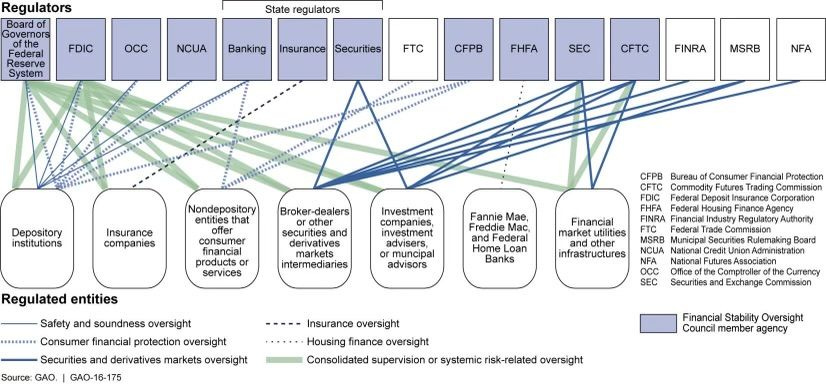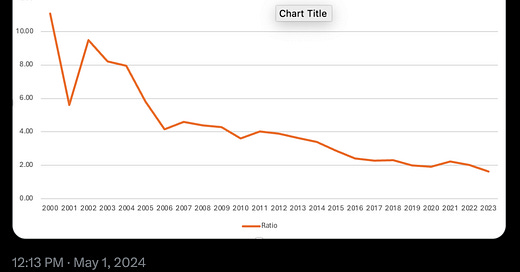You’ve probably heard the meme “the US innovates, Europe regulates”.
Sure, it’s partly true:
Europe does regulate a lot
Often its interventions are net unhelpful
Some officials spend way too much time focused on inane trivialities
But the doom is getting tiresome.
The meme is absurd even on its own exaggerated terms
It’s trite even to list DeepMind, Wayve, Revolut, Mistral, Novo Nordisk, ARM, ASML, Spotify and thousands more European companies who are either genuine path-breakers or clearly superior to their US equivalent (Airbus, anyone? 👀).
Equally, US regulated markets exist too, they are absurdly complicated to navigate, and their blend of culture war/techlash maelstrom is directly closing off innovation. Florida and Alabama have banned the sale of cultivated meat. The SEC has waged a war on crypto so hard that a16z moved to London. And the US is so much more litigious than the UK and Europe, it’s just the cost and caution imposed by millions of distinct lawsuits is hidden from view. Brussels institutions are big and visible, so make better targets.

The innovate vs regulate framing also hides huge opportunities where startups can thrive, e.g.:
The value in abstracting away regulatory complexity from end users, particularly across different jurisdictions (Stripe, Revolut, Flexport, etc.)
The value in taking the harder, regulated path to get closer to the actual pot of gold. See healthtech companies in the US: those that take FDA regulations in their stride and can actually get to market have better exits, in a shorter time frame. Those that kick the can down the road find it harder to gain clinical traction, so can be left just innovating around the margins.
And as
has set out before, most of Europe’s outlier successes have been in regulated markets: The Regulated Market Opportunity in VC
Europe will never be the US, and that’s okay
Europe is one continent, but not one country. Its starting point isn’t ‘fragmentation’ so much as 27🇪🇺 (+1 🇬🇧) countries with their own independence, languages and sovereignty, contingently bonded in a fragile, partial and incremental union.
Europe absolutely has further headroom for integration. It would be great to have a single way to register a company across Europe; to truly fulfil the digital single market promise; to pool institutional capital across countries and maybe even to consolidate stock exchanges. We’re as impatient as anyone about wanting to see progress here.
But when tax officials in Barcelona and notaries in Berlin each want to impose their own way, then all of this is really downstream of a much bigger argument for pooling sovereignty further. Look around: that’s not an obvious vote-winner right now.
We should make that case, and aspire for the ecosystem to be as mature and competitive as the US. But decentralisation is a fact. Better to accept that reality and carve our own path.
Optimism is a choice
To that end, most of the dunking happens because:
The UK/EU tech ecosystem is just on time delay from the US
Markets take time to mature
People are impatient
We still have a way to go, but the European ecosystem is maturing. There will be more Wayves, more Mistrals. Doomers just need to catch up to reality:
I get the frustration, truly. But often this narrative is over-hyped by ignorant US investors and a handful of UK/EU cottage industry sycophants who have chosen transatlantic herd approval over originality. Criticising from the sidelines is so low agency.
As
discussed earlier this week: telling ourselves that Europe is some sort of backwater is holding us back. The story that 'we're the little sibling…there's something irredeemable about Europe' is preventing us from looking at what it is about Europe that we could actually lean into. We need to flip that narrative and get beyond it, rather than getting stuck in this doom loop.If you’re looking for a starting point, check out a few initiatives from those actually getting stuck in, think about how you can contribute, or start your own thing:
Our work backing companies in regulated markets to move as quickly as possible & our fixtheregulators.com campaign alongside it
Index’s NotOptional campaign
The eu/acc movement, led by Andreas Klinger & co
Airstreet Capital’s campaigns on spinouts & defence procurement
EF’s def/acc programme
Some of the wider policy community focused on UK/European science & technology progress, including txp, TBI, UKDayOne and more
Hit reply with any I’ve missed




